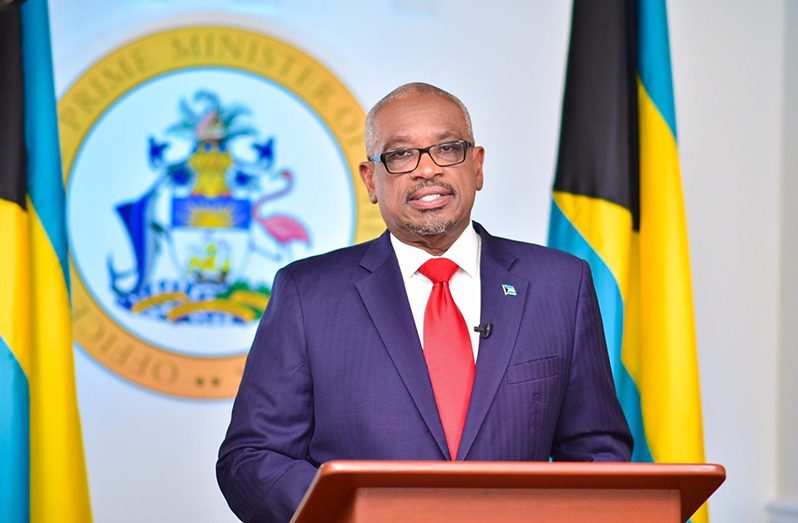-says country’s sovereignty must be preserved
SUPPORT for Guyana in its border controversy with its western neighbour, Venezuela, continues to grow, with The Bahamas being the latest nation to state that Guyana’s sovereignty and territorial integrity must be maintained and preserved.
The Government of The Bahamas, in a statement on Friday, announced that the island nation has joined with its CARICOM counterparts in standing with Guyana in its ongoing border controversy with Venezuela. Tension related to this controversy increased recently when President of Venezuela Nicolás Maduro, issued a decree claiming Venezuela’s sovereignty and exclusive sovereign rights in the waters and seabed adjacent to Guyana’s coast, west of the Essequibo River.
Based on reports emanating from Venezuela, the decree points to the creation of a strategic zone for national development called the “Territory for the Development of the Atlantic Façade”, which the Bolivarian Republic envisages will provide adequate protection and safeguard its jurisdiction. However, since Guyana has sovereign rights over the coast west of the Essequibo River, as far as Punta Playa, it follows, consequently, that only Guyana can enjoy sovereignty and exclusive sovereign rights over the adjacent sea and seabed.
The Caribbean Community (CARICOM) on January 12, 2021, issued a statement expressing deep disappointment and concern over action taken by Venezuela pertaining to its long-term border dispute with Guyana, including intimations of the creation of a strategic area of national development called “Territory for the Development of the Atlantic Façade.”
“The Bahamas joins CARICOM in standing in solidarity with Guyana and repudiating all acts of aggression by Venezuela against Guyana and fully supporting the judicial process underway at the International Court of Justice (ICJ) on the Guyana/Venezuela dispute,” the Bahamas government said.
On June 30, 2020, Guyana in its virtual presentation in the Arbitral Award of October 1899 (Guyana v. Venezuela) case said that not only is Venezuela’s current interpretation of the Geneva Agreement illogical and erroneous, but is also in stark contrast to the interpretation the Spanish-speaking country had when it signed the very agreement in February 1966.
Represented by a battery of international lawyers, Guyana said the agreement, in unambiguous terms, empowered the United Nations (UN) Secretary-General to determine an appropriate resolution mechanism to enable a peaceful settlement, which is the ICJ.
Guyana is seeking to obtain a final and binding judgement that the 1899 Arbitral Award, which established the location of the land boundary between then British Guiana and Venezuela, remains valid, and that the Essequibo region belongs to Guyana, and not Venezuela.
Most recently, the ICJ on December 18, 2020, ruled that it has jurisdiction to hear the Guyana, Venezuela border controversy case. It was reported that Guyana is confident that the international court will resolve the issue in its favour and that this will also settle the issue of maritime rights in the adjacent sea and seabed. But, under international law, this is now for the ICJ to decide.
This judicial process is one which CARICOM supports, since the regional bloc believes that it is intended to bring a peaceful and definitive end to the long-standing controversy between the two countries. The Commonwealth, Canada and the United States (U.S.) have also called on Venezuela to respect this judicial process.
The Canadian High Commission, in a statement posted recently on its Facebook page, stated that Venezuela’s recent claim that it has sovereignty over the area adjacent to Guyana’s Essequibo coast is concerning.
“The decision is in the hands of the International Court of Justice, and this judicial process must be respected,” the High Commission said.
Assistant Secretary (ag) of the U.S. Department of State’s Bureau of Western Hemisphere Affairs, Michael Kozak, said too that the U.S. supports the ICJ’s ruling that it has jurisdiction in the Guyana-Venezuela territorial border issue, which is the legal and peaceful way forward.
“Maduro’s aggressive claims don’t change this; they only show the world his disregard for his neighbours and international law,” Kozak asserted in a post on his official Twitter page. Also, U.S. Ambassador to Guyana, Sarah-Ann Lynch, reiterated the North American country’s call for a legal, peaceful resolution to the border controversy.
“I remind that sovereignty over this coast and the land territory to which it is attached, were awarded to Guyana (then British Guiana) in the 1899 Arbitral Award, whose validity and legally binding character Guyana is confident the International Court of Justice (ICJ) will uphold unequivocally,” President, Dr. Irfaan Ali affirmed during a recent address to the nation.
He said that regrettably, by decreeing that the seas adjacent to this territory belong to Venezuela, at least two fundamental principles of international law have been violated.
In the first violation, as outlined by President Ali, no state can unilaterally determine its international boundaries, whether land or maritime. President Ali contended that the fixing of an international boundary under international law can only result from an agreement between neighbouring states, or a binding determination by an international court or arbitral tribunal.
“Therefore, this attempt by Venezuela to attempt, unilaterally, to fix both its land and maritime boundaries with Guyana is a legal nullity, which cannot, and will not, be respected by any other state in the world, including Guyana,” the Head of State affirmed.
The second violation of fundamental international law referenced by President Ali is based on the fact that under well-established rules of international law, there is a fundamental principle that says, “the land dominates the sea.”
This means that sovereignty and sovereign rights in the sea and seabed emanate from title to the land that forms the coast to which those seas and seabed are adjacent.



.jpg)








